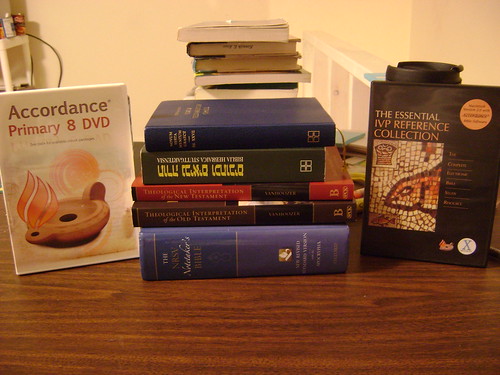We run our website the way we wished the whole internet worked: we provide high quality original content with no ads. We are funded solely by your direct support. Please consider supporting this project.
On Biblical Interpretation
Today we’re linking to a blog post from Rachel Held Evans about Biblical interpretation.
In her post, Rachel writes about the complexities Christians encounter when our scriptural interpretations differ (emphasis is Rachel’s):
What is perhaps most frustrating about engaging in such conversations within the evangelical community in particular, however, is that differences regarding things like Calvinism and Arminianism, baptism, heaven and hell, gender roles, homosexuality, and atonement theories often disintegrate into harsh accusations in which we question one another’s commitment to Scripture. In some cases, folks are so committed to their particular views on these issues they seem incapable of making a distinction between the Bible itself and their interpretation of it, and so any critique of that interpretation is seen as a critique of Scripture itself! And so we miss one another entirely.Instead of a lively, impassioned debate about the text, we engage in lively, impassioned debates about one another’s commitment to the faith.
She goes on to say:
For constructive dialog to happen, Christians must stop conflating differences in interpretation of Scripture with differences in commitment to Scripture. We must respond to one another’s questions, arguments, and ideas in kind, with more questions, arguments, and ideas, rather than avoiding the conversation altogether by dismissing one another as unfaithful.
We encourage you to click over and read the whole post. As you go throughout your day and interact with other Christians and debating various topics, these words are definitely worth remembering.
Related Reading

Sermon Clip: Spiritual Bodybuilding
In this sermon clip, Greg Boyd introduces the idea of charismatic gifts of the Holy Spirit, or those gifts often referred to as the supernatural gifts. In the full sermon he discusses each gift individually, and explains two pieces of information needed to understand the gifts. He discusses listening to the Spirit and using the…

Sermon Clip: You Are Not The Tree
What do the Gospels, Christmas Trees, and Eastern Spirituality have to do with one another? Greg Boyd explains in this weeks sermon clip. In the full sermon, we explore the Gnostics belief of the church in Colossae and how those relate to the New Spirituality movements rooted in Eastern thought of our day. We explore…

Lighten Up: MEology
It might be a red flag if you’re only interested in theology that serves your interests.

The Idolatrous Devotion to Inerrancy
Luca Rossato via Compfight Ed Cyzewski posted some thoughts on his blog on why he hates the word “inerrancy”. He agrees with something Greg has been saying for a while now that seems shocking to many: fighting for the idea of inerrancy can devolve into a kind of idolatry. This is well worth the read if…

Isn’t it contradictory to say Jesus is “fully God” and “fully human”?
READER: God is, by definition, eternal, having neither beginning nor end. Human beings are, by definition, finite, beginning at a certain point in time. How, then, can Jesus be both God (eternal) and human (finite)? Isn’t that a contradiction? Similarly, while God is omniscient, humans aren’t. How could Jesus be both omniscient God and non-omniscient…

Podcast: If the Cross is the FULL Revelation of God, Why Do We Even Need All the Rest?
Greg discusses the summation of the Bible in the crucifixion. http://traffic.libsyn.com/askgregboyd/Episode_0285.mp3

